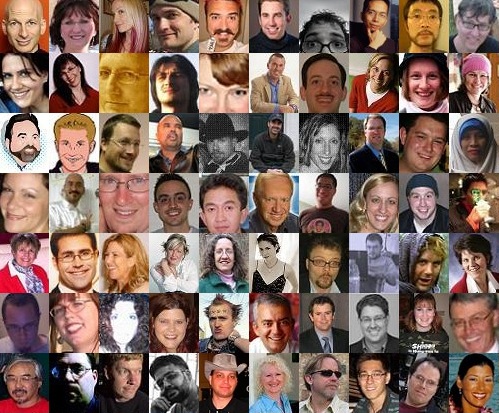mdst_110 / 2007_fall / week_15

some memebers of the digital republic, or seventy random people who happen to blog?
agenda
important links
keywords
questions from lecture
1. does the rise of bloggers necessitate a corresponding decline in the rise of journalistic professionalism,
or might it prompt a rise in the level of journalistic professionalism?
2. should google be regulated like a public utility? to what extent do you trust google as currently constituted to act in your (the public's) best interest?
3. are you more of a jeffersonian or a madisonian?
4. do you side more with lippmann or dewey? are citizens really unable to make important decisions because the world is too complex?
does this view undermine our notion of a democracy or is this how the constitution was designed?
5. does the web have republican or democratic ideals?
what role do you think market demands have played in determining the levels of republican and/or democratic ideals on the web?
6. what do you make of tim rutten's l.a. times critique of cnn's role in the youtube debates?
questions from readings
1. do you classify yourselves with tags like republican, democrat, conservitive, and/or liberal? are you inclined to read both like-minded sites and opposition sites? (54-5)
2. how might your "information diet" be restricted? what viewpoints are you not getting from your current news sources?
3. do you agree that in this new age of information (blogs) that civilty and self-criticism are lost?
4. sunstein claims that blogs are at the core of political polarization. do you think this is true? has political polarization increased since the emergence of the internet and/or the advent of blogging?
5. group polarization can lead to good things (civil rights movement, male/female equality)
but it can also lead to bad (hate groups, web sites by anorexics that encourage anorexia). Is there a way to weed out the bad and keep the good?
6. sunstein believes that the "mass media has been falling over time" and that in "'cybercascades' ... information, whether true or false spreads like wildfire."
so what type of news is the public supposed to trust? is there any source that can be viewed as trusted?
7. what cybercascades have you been a part of? have any affected you in other ways?
8. according to sustein, the idea of the internet as a democratizing tool is nice, but unrealistic. he argues that it is more of an echo chamber for the ideals we already hold. true?
does the ability to personalize your online experience (personalized homepages, personalized online newspapers) really remove your motivation to explore viewpoints different from your own?
9. how important are general-interest intermediaries to political and social well-being?
10. what are the environmental effects of an accelerating consumption treadmill? (134)
11. what's your attitude regarding government subsidies for arts and entertainment? (203)
12. sunstein discusses possible solutions to the problems he raises in chapter 9 of republic.com 2.0.
among these are self-regulation, publicly subsidized content, and "must carry" policies.
are any of these solutions feasible given the infrastructure of the internet and the predominance of the free-market economy?

